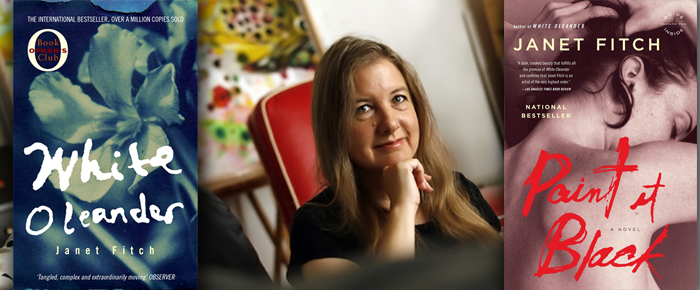
By Heidi Simmons
The author of White Oleander and Paint it Black recently lectured in Rancho Mirage to graduate students of the UCR Palm Desert Low Residency Creative Writing program. Her topic? “The Art of the Sentence.”
This may seem obvious and too simple for grad students, but Fitch is a dynamic teacher. She enlightened the students on the joys of writing an interesting string of words. “It is not enough to tell a good story,” Fitch said. “You have to write gloriously.”
And Fitch does write gloriously. Her book White Oleander was an Oprah Book Club selection in 2000. It is a story about a young girl, who after her mother murders an ex-lover and is imprisoned, must survive the treacherous world of multiple foster homes. It is a coming of age story narrated by the girl as she is shaped and transformed by the lives of those with whom she lives. The girl and her mother awkwardly try to come to terms with their own precarious relationship.
Paint it Black was released in 2007. Different from White Oleander in style, her sophomore novel tells the story of another teenage girl struggling to make a life for herself after her boyfriend kills himself. Both stories are set in Los Angeles, Fitch’s birthplace and hometown.
Before Fitch was published, she worked as a typesetter and a waitress. “It took ten years of sending stories out weekly and getting back tons and tons of rejection letters,” said Fitch. “It was a weekly tidal wave of rejection before I got published.”
One rejection letter from a publisher got her attention. He said, “Good enough story, but what is unique about your sentences?” It took Fitch six weeks to figure out what he meant and what an interesting sentence was all about.
“I realized that there was more to good writing than just writing good characters, drama and sweeping landscape,” said Fitch. “I wrote the story, but not the sentence. I wrote way too fast. I finally understood there was an art to writing a sentence. I was a bad writer before I became a good writer.”
A history major in college, Fitch worked with a poet to improve her skill as a writer. “Poets win it with one word up against another,” said Fitch. “The first thing she taught me was that a cliché is anything you have heard before, ever!”
“As writers, we owe it to the reader to create something fresh every time,” said Fitch. “The challenge is to create new language.” Fitch says the more a writer reads the more aware writers become of clichés. “Language must be clear so the reader can ‘see’ it. A new picture must be created. A sentence must be custom made.”
Pointing out that the English language is noun based, Fitch said that English speakers don’t use action words — verbs — well. She said English has four times more nouns than any other language on earth. English speakers, she said, even turn nouns into verbs. Fitch said the average person – educated or not – uses the same 20 verbs whether describing a run in their stockings or their mother’s death.
Fitch says the first thing to do is to check your verbs and stop using the same ones over and over. “Verbs are the only part of speech that can move in your writing,” she said. “The verb is the active part of the sentence. It does the heavy lifting. Nouns can’t do anything. If your work is static, look at your verbs and use the most specific action word.”
“Good words have shape. They have corners,” Fitch said. “You want language with textures and pieces.” She suggests reading out loud before writing. “It helps me become a better writer. I read poetry out loud for ten minutes. It tunes my ear. You have to address the sound and feel of the words.”
“Alliteration (the repetition of consonant sounds in words) and assonance (the repetition of vowel sounds) are import when writing,” said Fitch. “The repetition makes for interesting shapes in your mouth. I think these are good things in prose to get more sound, music in your writing. It’s what good language feels like.”
Fitch talked about reader’s wanting to hurry to see what happens in a good story and at the same time wanting to linger, to enjoy the beauty of the sentences. “The reader has a double mind,” she said. “It sets up tension in the reader that is the best of all possible reading experience when they both are present.”
“The thing readers crave is specificity and variety,” Fitch said. “They want to see an author who can control the length and grammar of his or her sentences. Then the reader begins to trust the writer. A writer needs to have the ability to control long and short sentences. It is about word choice and structure of the sentences. That’s what creates style.”
Teaching is something Fitch clearly enjoys. She is certain she is a good teacher because she herself had to learn how to become a good writer. “If I was born knowing how to write well, I probably wouldn’t be able to tell you,” she said. It is fantastic to know that someone with so many rejection letters can learn to write well enough to have an Oprah Book Club best seller.
Besides her two novels, Fitch’s short stories have been published in anthologies and journals that include Los Angeles Noir, Vogue and the Los Angeles Review of Books.
Fitch is currently finishing her third novel, which is set during the Russian revolution. You can pick up writing tips as well as read her rants, meditations and short-short stories on her blog www.janetfitchwrites.wordpress.com











































